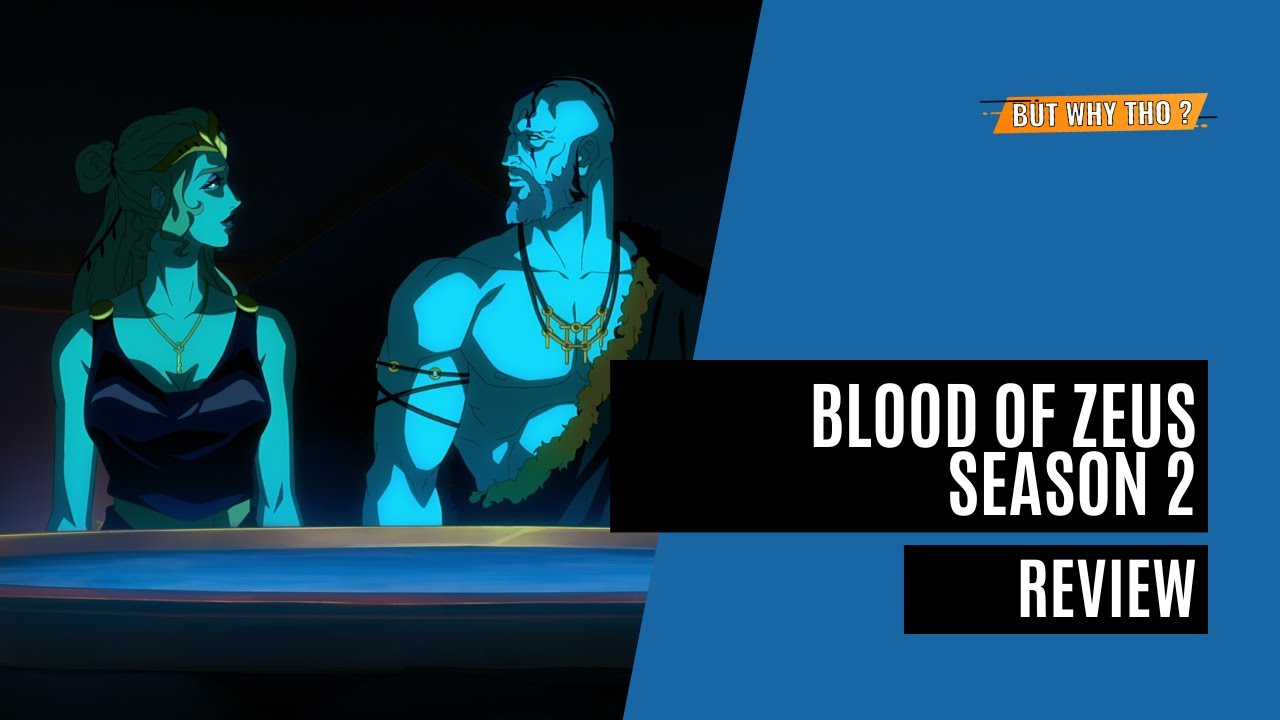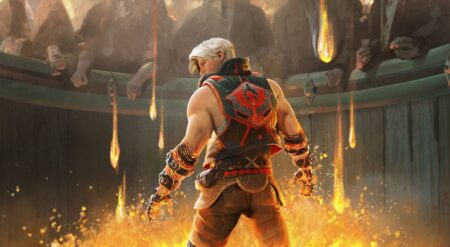Seraphim stole the show in Blood of Zeus Season 1, and now, in Season 2, he’s turned from a villain into a co-lead alongside his half-brother Heron (Derek Phillips). Last season, Seraphim worked for Hera (Claudia Christian) and now, he’s working with Hades (Fred Tatasciore). After his death in the finale of the first season, Seraphim finds himself in the Underworld with a choice: Repentance or Tartarus. It’s a choice he makes easily, Tartarus. And that starts his story. We spoke with Elias Toufexis, the voice of Seraphim to discuss the character, Greek mythology, voice acting, and the power that adult animation has.
This interview has been edited for length and clarity. To listen to the full interview with Elias Toufexis, press play on the audio player below.
BUT WHY THO: I would say that [Blood of Zeus] Season 2 is definitely [Seraphim’s] season in a way. He gets to double down on who he is, but you also get to see him grow a bit. As an actor, how do you build the bridge between you and the character that you’re portraying? Do you have any ways that you do that? Do you identify with parts of the character yourself?
ELIAS TOUFEXIS: Well, I think you have to identify with the character you’re playing—even if you play bad guys, and I mean, I play a lot of bad guys in TV and a lot of bad guys in animation. If you don’t connect with them, you’re not going to connect with the audience. You have to connect with your character, and you have to justify what they’re doing. In Seraphim’s case, it’s a little easier because he goes through so much stuff. So you kind of understand why he’s doing what he’s doing. You don’t agree with him, you know? But you have to justify it as an actor, otherwise, there’s no real point in playing it.
You can’t just play evil because it’s boring. You [have to] find a way to connect, and in the first season, it’s about connecting with what he wanted and also what he’s been through… And in the second season, he goes from the antagonist of the show to the co-lead of the show with his brother, [Heron]… I wanted to get a little more empathy out of the audience this time around. But that also is in writing. The way that the character is presented, the choices he makes, and what he’s put through, you kind of start empathizing with him a little.
Again, it’s hard to forgive him for all the murder and stuff. But you can relate and empathize with [Seraphim]. He says, at one point in this second season, “I’m not the man I was…” I have to connect to the character no matter what, but playing somebody who’s on a redemption arc is a lot easier than just justifying murder.

BUT WHY THO: And I think that there’s a really beautiful complexity to Seraphim as a character and also how you play him across the two seasons. In season one, all of the characters are very focused on anger [and] righteous anger [specifically]… Each character feels [the need] to correct the wrongs done to them in their own ways, regardless of how they go about it. Whether it’s Hera or Seraphim, or even Heron to a point as well. And season two—when I watched it—I actually felt like this season is more grounded in love. It’s grounded in identifying the pieces of yourself, what you’ve lost, what you’ve loved, and how you’ve moved on from that.
For Seraphim, I thought that the way that the story was handled was really beautifully. He has a relationship with the past that seems different than what we would expect from most villains. He can’t let go of it, and it is always inside of him. But he also understands he cannot change it, in a way. I wanted to ask how you approach kind of building those emotional layers of a character when you’re providing the voice? How do you feel he’s grown from season one to season two?
ELIAS TOUFEXIS: When they told me that we got picked up for a second season, I had ideas of where I wanted to see Seraphim go and I remember getting a breakdown on the board. But once the story was clear to me, I remember thinking [that this] was exactly what I wanted. [It’s] exactly what I would want Seraphim to go through [in terms of a] of redemption arc while still maintaining [who he is].
I liked the idea of the redemption arc… But I didn’t want to lose him. Seraphim, [even] while doing that redemption arc, he’s still in it for himself, so to speak. But at that same time, [Seraphim] does say one of my favorite things about this season… I just want these people I’ve harmed to be okay in the afterlife. I want them to forget about me and forget about what I did to them. And that’s what I’m going after [as an actor]. It’s a redemption [arc], but not really. It’s a redemption of his soul but he’s not trying to buy his freedom and buy his afterlife. He is trying to fix his wrongs.
Again, he’s done a lot. He has a lot of a lot of fixing to do. But those two women, in particular, Gorgo and his mom, were two people that he did not want to hurt. So his sacrifice… is a redemption for his soul, but it really is about giving away himself for their freedom… That’s what makes him so interesting to play this season.
I love that scene—without giving too much away where—he’s talking [and says] “I don’t care what happens. But you’re gonna give me what I want, and what I want is them to be okay.” [It’s] not “I want my freedom” or “I want my revenge.” All that stuff has gone for him. It’s “I want them to be okay.”
BUT WHY THO: I think it’s a really beautiful way to tackle the idea of redemption. But I think right now in media, we’re kind of at this weird crossroads where everybody wants to be sympathetic to villains. They want the villain to be completely redeemed versus maybe being empathetic towards circumstances. The complexity of justice in Greek myth really lends to allowing someone to maintain their rough edges, but also understand that because he did bad in the name of the person that he loved he has also helped to doom her to an afterlife of suffering.
[In Blood of Zeus Season 2] we see Seraphim on trial in the underworld. Actually, [it’s] one of my favorite parts of the season, where Seraphim refuses to repent, and he refuses to bow to another God. He refuses to accept the absolution that you’re kind of talking about to make it easier on [himself]. That’s what I think defines the character. But I need to know, what do you think defines [Seraphim] as a character?
ELIAS TOUFEXIS: At the beginning of the second season, [Seraphim] is just like, “Just get off my back. You’ve got nothing for me.” He is so adamant about it that he’ll endure literal torture [in Tartarus]. He’d rather endure the torture than kneel [to a god] again. But when the opportunity is presented to change his past, he knows that he can’t change it. But maybe he can fix what he’s done with these women, particularly to Gorgo.
[Seraphim] does kind of what he did with Hera, which is ‘I’ll use these gods if they’re using me.’ But in this season, his motivation is much more than just revenge. It’s more of a legitimate moral reason reasoning for doing what he’s doing. And yeah, [Seraphim] becomes a different man, but he’s still going after what he wants at the expense of whomever [is in his way], even his brother.
He even says that at one point. “I’ll still kill you. I hope everything’s fine. I hope you don’t get in my way. But if you do, I’m still gonna kill you.”

BUT WHY THO: Seraphim is on a very similar journey to Heron this season. Actually, when you compare the two, they’re both dealing with guilt. They’re both dealing with the past in the only ways that they know how, and they’re both kind of dealing with moving forward.
ELIAS TOUFEXIS: It’s very interesting because they structured it incredibly well—Heron is going darker and Seraphim is going lighter. They’re meeting kind of in the middle, and somewhere in the middle, in the gray area, is where people actually are. It’s great to see this really evil character—maybe justifiably evil, but still an evil character—come a little closer to the light and a character coming a little closer to the dark. I love it.
By the way, I know we talked about Seraphim because I play Seraphim. But I love Heron’s arc… Derek [Phillips] and I have this fake antagonistic relationship because we bring our characters to real life. But in actuality, I’m sitting there watching him [as Heron] and going, “This guy’s amazing!” Literally, his voice work is so [good]. And like, everybody’s phenomenal. But Derek in particular—for me—stood out. He’s dancing this dance of a character that’s really difficult to pull off. And he does it so well.
BUT WHY THO: We look at the history of Greek myths for thousands and thousands of years. And it has been reimagined [many] times and seen throughout [media]. I think that every iteration of a myth is something special, and then a new part of the [long] legacy. How does it feel for you to be a part of this part of this section of of Greek mythology?
ELIAS TOUFEXIS: [Blood of Zeus] is introducing people [to Greek mythology] most definitely. I was in Greece in December for the first time—I’m half Greek—and saw the history thereafter doing Blood of Zeus…was really trippy. All of these gods, the characters that are in Blood of Zeus, were etched in actual stone 2500 years ago. These [stories] have been around forever.
If by anyway if in any way, our show reintroduces or introduces people to Greek mythology, and then they go look up what people actually thought about these gods 2000 years ago—that’s amazing. That’s incredible. We’re very happy with that. One thing that is cool is [that] these are original characters in [Seraphim and Heron]. So, it’s fun to be kind of plugged into this mythological, mythological history so to speak.
These characters have never been heard of before, but through the show, they were part of the whole thing… One thing I love about this season is that the first episode… is just another view of what was happening during the battle. You’ve heard all the mythological stories about Greek gods. But actually, there were these two guys in there, too…
I hope people look up Greek gods and go watch Clash of the Titans and go read Homer to a degree or go read up on the old gods… They’re the Avengers of 2000 years ago.
BUT WHY THO: Oh, one hundred percent! [laughs] As an actor [who has done on-camera] and then also a voice actor, what do you think it is about adult animation that makes it special as a medium for storytelling?
ELIAS TOUFEXIS: Well, it’s freedom, right? [BWT: Yeah!] It’s freedom within a budget. If you wanted to do Blood of Zeus as a live-action, you’re talking hundreds of millions… It also grants you freedom, I guarantee you. Like the Clash of the Titans [movies] that came out [around] 10 years ago, they were limited in what they could do… With animation, [while there is still a budget], we can pretty much [do] anything. Anything you can imagine we can do it. I’m sure [the animation studio] had budgetary constraints and stuff, but for the most part, you imagine [it] and you can do it. That’s the good thing about animation. Adult animation right now is just so good with everything. It’s just constantly impressing me…

BUT WHY THO: Animation like you said, [has] a freedom to it. It allows you to take a depth of storytelling that is significantly harder in live action. As an actor, is there anything that you’ve ever thought about that you wanted people to understand more or appreciate more about voice acting? That you don’t think maybe they don’t?
ELIAS TOUFEXIS: Good voice acting is a lot more layered than people think. If you watch the show and then go back and listen to the show—like close your eyes and listen to your favorite and hear all the different levels that the actors are bringing to these characters. It’s not just saying the words and pretending you’re on camera and stuff like that. There are a lot of tricks of the trade, so to speak, that the good actor and Blood of Zeus is just full of them.
You know, like Fred Tatasciore, a legend in this business and just kills it as Hades. Jennifer Hale is in another legend, Cissy Jones is a legend, all these people are phenomenal. There’s a reason they’re the best voice actors in the world—or at least America—because you can hear the layers of their performances coming through.
I would say that the only thing that people may not know is how layered these performances actually are. At the end of every Seraphim day, I was exhausted. I was sweating, and not because I was screaming, but because it was emotional… I [have to] really think about what this feels like talking to or [when he] goes to [Gorgo’s] grave. That’s exhausting. [You] really [have to] get into that emotional space. It’s sad. And, all that stuff hopefully is coming through. And it’s all because we really like it.
I remember there was an actor who once said, like, “Oh, voice acting is the easiest thing in the world. [They talk into a mic] and then they give me a million bucks.” It’s not good voice acting [when it’s like that]. It is a lot more difficult and a lot more complex than people think it is. That’s because of the technical thing like talking to the mic in a specific way. But it’s also [about] getting emotion across and getting points across and just using one tool, [your voice]. I love on-camera acting. But in on-camera acting, I don’t even have to be talking and I could give you a million emotions, right?
But with Voiceover, it’s all about just one thing. And then you know, of course, the direction and animation and music and all that kind of stuff. helps. But really, you’ve only got one tool to use. It’s trickier than people think… It’s more complex than [just] great voices, for even silly cartoons. It’s a little more difficult than just doing crazy voices. That’s the only thing I think people might not know.
BUT WHY THO: As a final question, just really what do you hope fans take away from Blood of Zeus Season 2 when they wrap that final episode? What do you want them to be feeling and thinking?
ELIAS TOUFEXIS: I know what they’re gonna be feeling. [laughs] But I mean, I hope enough people watch so we can get the third season because people are gonna be feeling, “We need a third season.”
I mean, selfishly, I just think of Seraphim. I hope that people get really interested in what they’re trying to do with him, and by the end of the season, they go, “There’s a lot more to come with this guy.” Without giving anything away, his redemption arc is there but it’s not complete by the end of the show. [And it] may never be actually fully complete—he has a way to go… Even though he does take giant steps—No pun intended… I really hope people watched so we can get more. We have more stories because we have so much more to tell.
Blood of Zeus Season 2 is streaming now, exclusively on Netflix.








